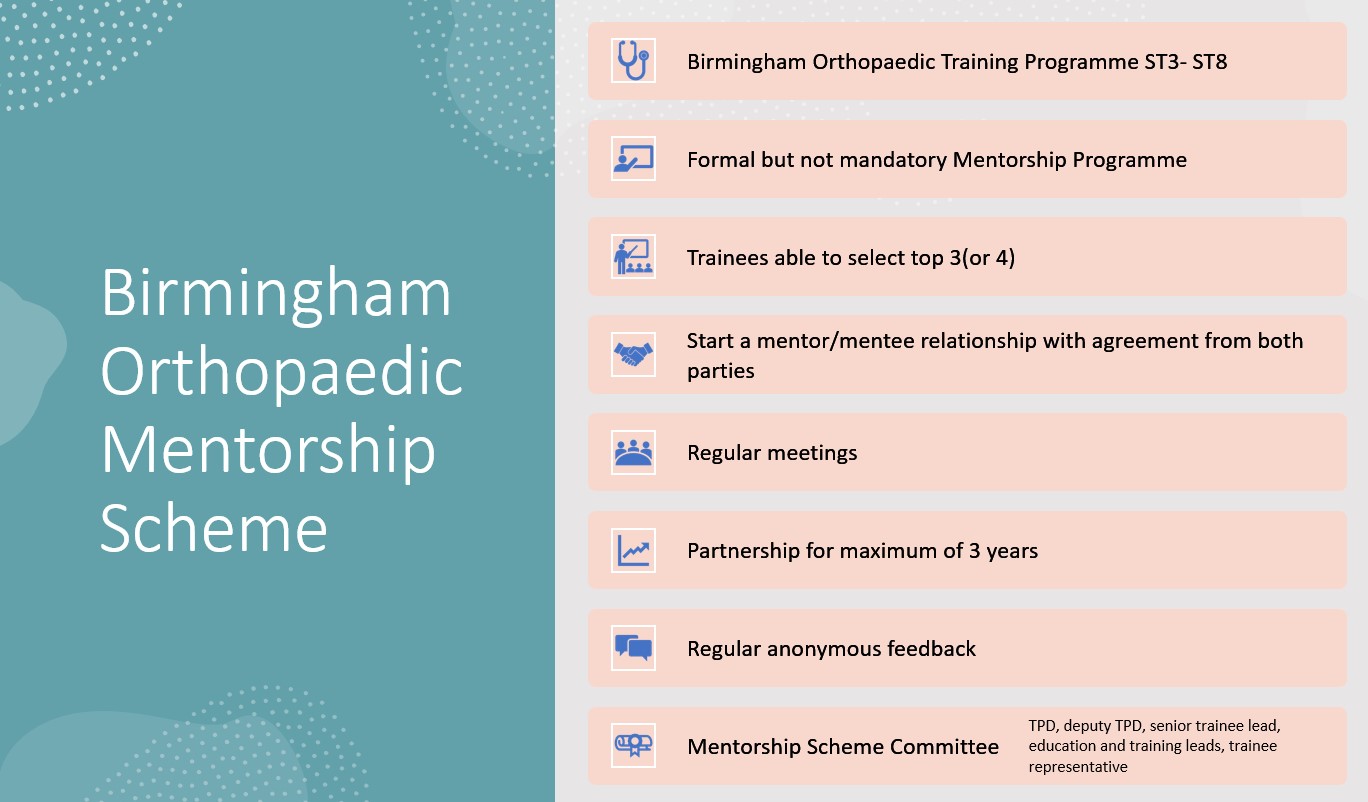Birmingham Orthopaedic Training Programme Mentorship Scheme
Mentoring is a concept which is explicitly encouraged by the Good Surgical Practice and can help support surgeons in adopting new approaches to clinical scenarios, whilst promoting reflective practice. Mentoring schemes can have positive effects on both mentor and mentee by providing opportunity for new ways of thinking and behaving.

Definition
Scheme
Selection
The scheme will take the form of a selection of mentors being mutually selected by mentees (trainees). Each mentor will write their own descriptor/bio and these can be reviewed by the trainees. The trainees will then select their chosen mentors, and ranking their top three choices with reasons why (similar to job requests). The mentorship panel will then try to ‘best fit’ allocations, which will be agreed by both parties (trainee and mentor). A contract of engagement will then be set up and completed by both parties, outlining confidentially and regularity of meetings. (Please see Selection Process document).
Meetings
Regular meetings will take place with mutual agreement, with their regularity having been laid out in the first meeting and mentorship agreement (the scheme would advise every 2-3 months). These meetings can take the form of telephone, virtual or face to face meetings dependant on the mentor/trainee availability. A discussion at the first meeting about impromptu meeting would be advised to prevent any problems relating to frequency of informal contact.
Training
To get the most out of the mentorship scheme, having training in mentorship from both the point of view of the mentor as well as the mentee (trainee) is strongly advised. This will enable the trainee to benefit as best as possible from the relationship. Preparation by the trainee and mentor before each meeting will help to focus everyone accordingly and reflect on what has been achieved already. Whilst specific training for trainees may not be widely available, general mentorship training will be helpful as a trainee and as a potential mentor in future. The following are a list of e-learning or webinar training courses but are not exhaustive.
E learning for Health: medical mentoring training (you will need to register an account with e-lfH)
Midlands Mentoring skills development Programme for senior leaders (register for 3 session interactive webinar course)
Additional courses of interest to established mentors (extended mentoring skills, managing difficult conversation, wellbeing and resilience + others)
Feedback
Regular feedback will be obtained from trainees during the mentorship programme. Anonymous feedback relating to the mentor will be obtained, as well as feedback on the scheme and the process itself. This will be utilised to improve and refine the scheme going forward.
Troubleshooting
It maybe that during the process both the mentor and/or trainee have some difficulty that cannot be resolved within the mentorship relationship. Escalation pathways have been generated for this situation to assist both the trainee and mentor (please see Escalation Pathways document).
The intention is that this scheme will continue for many years to come, with a regular recruitment of new mentors with improvement and refinement of the scheme. The core team will be led by Mr Khalid Baloch Training Programme Director, with support from Mr Deshpande, Ms G Smith, Mr D Richardson and Mr B Ellis, alongside representatives from the mentors as well as trainees. This scheme is entirely voluntary but it is strongly advised that trainees take part for their own future development and training.
